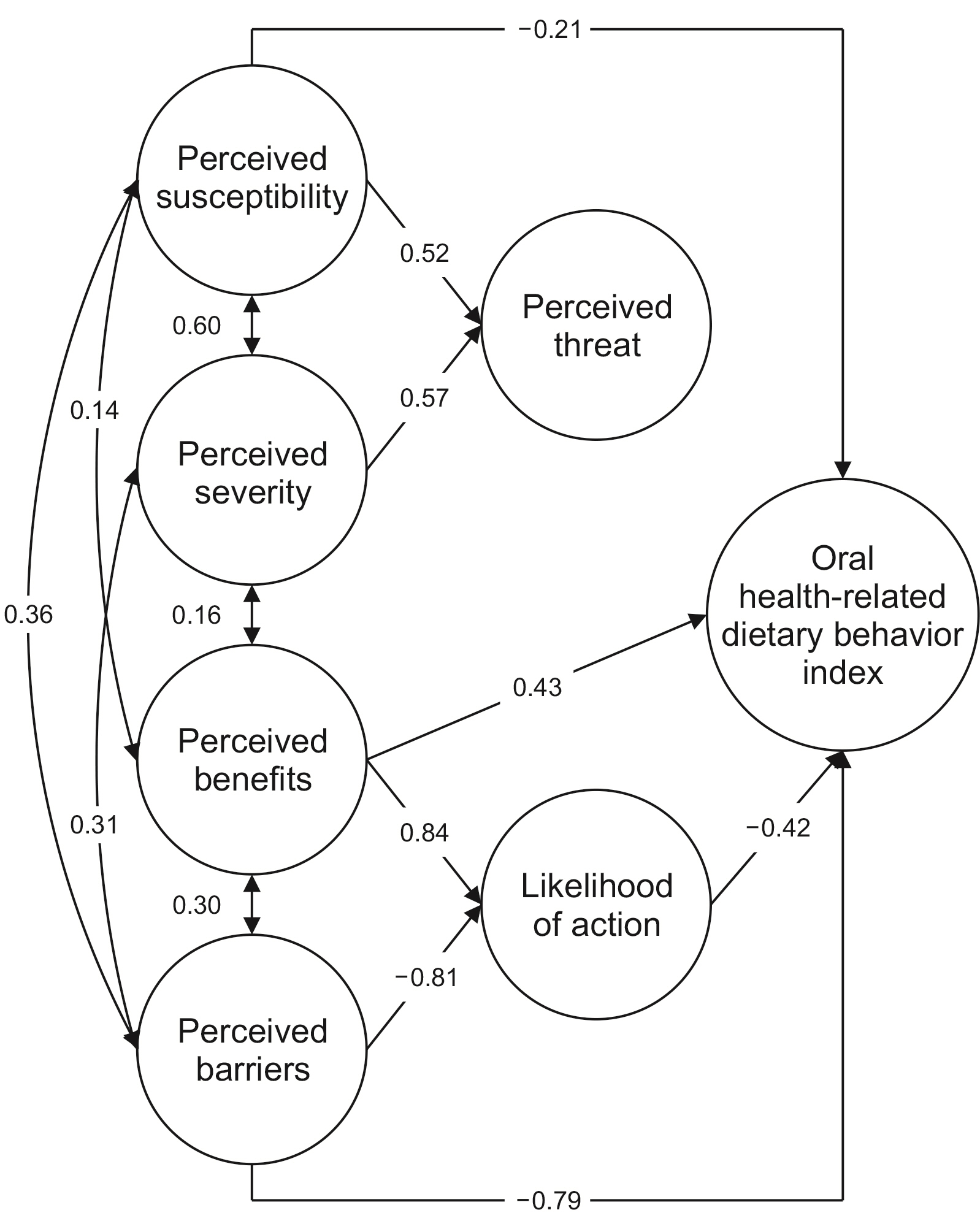J Korean Acad Oral Health.
2023 Mar;47(1):15-20. 10.11149/jkaoh.2023.47.1.15.
The application of the health belief model in oral health-related dietary behavior
- Affiliations
-
- 1Department of Preventive and Public Health Dentistry, College of Dentistry, Wonkwang University, Iksan, Korea
- 2Institute of BiomaterialsㆍImplant and Institute of Wonkwang Dental Research, Wonkwang University, Iksan, Korea
- KMID: 2541086
- DOI: http://doi.org/10.11149/jkaoh.2023.47.1.15
Abstract
Objectives
This study aimed to investigate the relationship between oral health beliefs and oral health-related dietary behavior.
Methods
The participants of this cross-sectional study were 728 middle school students living in Jeonju who were selected through convenience sampling. For the survey, self-administered questionnaires were completed in individual settings. The analysis model was the oral health belief model, and the analysis method was path analysis.
Results
Among oral health beliefs, perceived susceptibility, perceived severity, perceived barriers, and self-efficacy were found to be correlated with the oral health-related dietary behavior index. Multiple regression analysis showed that factors affecting the oral health-related dietary behavior index were gender (female), perceived susceptibility, perceived severity, perceived barriers, and self-efficacy. Path analysis showed that variables that significantly impact the oral health-related dietary behavior index are perceived susceptibility, perceived benefits, perceived barriers, and likelihood of action. The factor with the greatest impact was perceived barrier; the lower the barrier, the higher the level of dietary behavior undertaken to prevent dental caries.
Conclusions
Oral health beliefs are related to oral health-related dietary behavior. Since perceived barriers had the greatest correlation with oral health-related dietary behavior, measures must be taken to help remove the barriers.
Figure
Reference
-
References
1. Amin TT, Al-Abad BM. 2008; Oral hygiene practices, dental knowledge, dietary habits and their relation to caries among male primary school children in Al Hassa, Saudi Arabia. Int J Dent Hyg. 6:361–370. DOI: 10.1111/j.1601-5037.2008.00310.x. PMID: 19138188.
Article2. Majem LS, Closas RG, Ramón JM, Manau C, Cuenca E, Krasse B. 1993; Dietary Habits and Dental Caries in a Population of Spanish Schoolchildren with Low Levels of Caries Experience. Caries Res. 27:488–494. DOI: 10.1159/000261586. PMID: 8281564.
Article3. Park SH, Choi BY, Oh WY, Lee HS. 2010; Relationship between diet behavior and dental caries experience among elementary schoolers. J Korean Acad Oral Health. 34:327–337.4. Jang JH. 2008; The relationship of diet habits, obesity and Level of oral health among elementary school children. J Korean Acad Dental Hygiene Education. 8:229–257.5. Lee MY, Choi EM, Chung WG, Son JH, Chang SJ. 2013; The effects of perceived stress on dietary habits and oral health behaviors in Korean adolescents. J Dent Hyg Sci. 13:440–448.6. Broadbent JM, Thomson WM, Poulton R. 2006; Oral health beliefs in adolescence and oral health in young adulthood. J Dent Res. 85:339–343. DOI: 10.1177/154405910608500411. PMID: 16567555. PMCID: PMC2276695.
Article7. Poutanen R, Lahti S, Hausen H. 2005; Oral health-related knowledge, attitudes, and beliefs among 11 to 12-year-old finnish schoolchildren with different oral health behaviors. Acta Odontol Scand. 63:10–16. DOI: 10.1080/00016350510019676. PMID: 16095056.
Article8. Stokes E, Ashcroft A, Platt MJ. 2006; Determining Liverpool adolescents' beliefs and attitudes in relation to oral health. Health Educ Res. 21:192–205. DOI: 10.1093/her/cyh055. PMID: 16192312.
Article9. Solhi M, Zadeh DS, Seraj B, Zadeh SF. 2010; The application of the health belief model in oral health education. Iran J Public Health. 39:114–119. PMID: 23113044. PMCID: PMC3481698. PMID: 546d055054764473840e9e0b03bc40c8.10. Carpenter CJ. 2010; A meta-analysis of the effectiveness of health belief model variables in predicting behavior. Health Commun. 25:661–669. DOI: 10.1080/10410236.2010.521906. PMID: 21153982.
Article11. Ji MG. 2008; A study on middle school students' oral health belief and oral health practice. J Korean Acad Dental Hygiene Education. 8:165–180.12. Lim HJ, Kim HJ, Ahn YS. 2015; The impact of health belief model in the middle and high school students on oral health behaviors. J Korean Soc Dent Hyg. 15:111–118. DOI: 10.13065/jksdh.2015.15.01.111.
Article13. Chang BJ. 2008; Study on relation between dental Health beliefs and dental health behavior in the high grade students of elementary school. J Dent Hyg Sci. 8:163–168.14. Jang JH. 2009; The relationship of psychosocial factors, dietary habits and DMFT Index in adolescents. Korean J Health Educ Promot. 26:23–33.15. Janz NK, Becker MH. 1984; The Health Belief Model: a decade later. Health Educ Q. 11:1–47. DOI: 10.1177/109019818401100101. PMID: 6392204.
Article16. Jo HS, K CB, Lee HW, Jeong HJ. 2004; A meta-analysis of health related behavior study based on health belief model in Korean. Kor J Psychol :. Health. 9:69–84.17. Kim HA. 2004; Comparison of normal weight vs obese children in terms of family factors, eating habits and sociocognitive factors. Child Health Nurs Res. 10:300–310.18. Kim HA. 2000. Influences of the parents' food habits and health beliefs on child obesity [master's theses]. Seoul National University;Seoul: [Korean].19. Basak CA, Nilufer K. 2005; Self-Efficacy Perspective on Oral Health among Turkish Pre-Adolescents. Oral Health Prev Dent. 3:209–215. PMID: 16475449.20. Kang MJ, Park YS. 2004; Relation between self-efficacy and health promotion behavior of elementary school students. JKSSCHE. 5:43–70.21. Kim YI. 2013. An oral health promotion behavior model for adolescents [dissertation]. Wonkwang University;Iksan: [Korean]. DOI: 10.1002/9781119591641.ch32.
- Full Text Links
- Actions
-
Cited
- CITED
-
- Close
- Share
- Similar articles
-
- Factors Related to Health Behaviors of the People in an Urban Community: Based on the Health Belief Model
- A Study on Knowledge of Oral Health, Behavior, Self-Efficacy, Belief, and the Number of Dental Caries of Elementary School Students
- Comparison of practice of dietary guidelines and health beliefs according to stage of weight loss behavior change among male workers
- A Study on Osteoporosis Knowledge, Health Beliefs and Health Behaviors among Female College Students
- Comparison of Health Belief Levels and Health Behavior Practices according to Lifestyle among Adults Residing in Seoul


